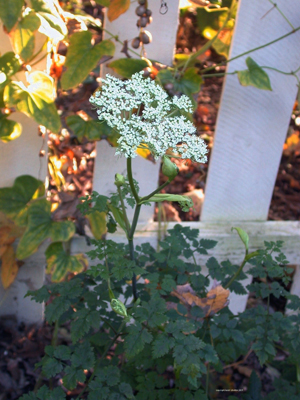Angelica sinensis
| See Also | Botanical Monographs |
|---|
Dong quai (Angelica sinensis) is a common women's tonic used in a number of conditions such as heavy menstrual bleeding, dysmenorrhea, bleeding between periods and a number of other conditions. To explore the characteristics, medicinal uses and prescribing considerations of this herb in more detail, check out the references indicated.[1], [2]
Contents
Characteristics
- Common Names: Dong Quai, Dang Gui, Tang Kuei, Chinese Angelica, Female ginseng, Female tonic, Woman's herb, Toki, Tangwi
- Family: Apiaceae (Umbelliferae)
- Habitat: Angelica sinensis is native to China, Japan, and Korea
- Parts Used: Root, whole plant as liver tonic
- Constituents: coumarins, volatile oils, phytosterols, ferulic acid, sucrose, carotene, vitamin B12
- Medicinal Actions: tonic for the uterus, liver, digestion, and the body as a whole (whole plant), antispasmodic, anti-inflammatory, aromatic, antianaemic, analgesic (reduces menstrual pain), sedative, emmenagogue, antipyretic, carminative, inhibits platelet aggregation, normalizes blood pressure, antiarrhythmic, cardiac tonic, mild laxative, diaphoretic, pectoral, phytoestrogen, stimulant
Uses
Historical Uses:
Angelica sinensis was used in China as the main tonic herb for treatment of female disorders such as menopausal symptoms, especially hot flashes and migraine headaches. It was also used to assure a healthy pregnancy and easy delivery.
Medicinal Uses:
- menorrhagia (heavy menstrual bleeding), dysmenorrhea (painful periods), metorrhagia (bleeding between periods), irregular menses, amenorrhea (lack of menstruation), infertility, poor sexual function, menopause especially with hot flashes
- Blood Tonic:
- dependent on a suitable Traditional Chinese Medical diagnosis
- poor circulation to abdomen, hands, and feet, anemia from blood loss
- atherosclerosis (preventive)
- Other Conditions:
Prescribing Considerations
The information provided is intended to augment the treatment from a naturopathic doctor or other trained medical professional. Although most herbs are generally safe, it is recommended that you avoid self-prescribing especially when there is an underlying ongoing medical condition, if you are on any prescription medications or if you are pregnant or breastfeeding.
Formulations and Preparation
- Decoction - 3-15g daily; three times daily for general tonic effects
- Tincture - 3-5mL tincture (1:5) three times daily
- Root powder - 1-2 g three times daily
- Root may be taken raw, steamed for a few minutes as a blood purifier, or cooked
Safety
The safety and prescribing considerations for this herb include:[3] [4]
- Generally regarded as safe.
- Side-effects are rare but may include diarrhea and phototoxic skin reaction.
- Cautions and Contraindications: pregnancy, hypermenorrhea (heavy periods), hemorrhagic (bleeding) disease, history of spontaneous abortion
- Drug-Herb Interactions.[3]
- Warfarin and Related Oral Vitamin K Antagonist Anticoagulants - Minimal to mild adverse interactions, vigilance necessary; The addition of Angelica sinensis may require warfarin treatment to be adjusted in the case of prior stabilization to prevent excessive bleeding.
- Erythropoiesis-Stimulating Agents - Potential or theoretical beneficial or supportive interaction with professional management; Angelica sinensis may have an additive effect on hematopoiesis. It may also help with the responsiveness to the drug.
References
- ↑ Boon Heather, Smith Michael (2009) 55 Most Common Medicinal Herbs: The Complete Natural Medicine Guide Second Edition Institute of Naturopathic Education and Research, CCNM Toronto.
- ↑ Godfrey Anthony, Saunders Paul, Barlow Kerry, Gowan Matt (2011) Principles and Practices of Naturopathic Botanical Medicine, Advanced Botanical Medicine. V3 CCNM Press, Toronto.
- ↑ 3.0 3.1 Stargrove Mitchell Bebell, Treasure Jonathan, McKee Dwight L (2008) Herb, Nutrient and Drug Interactions: Clinical Implications and Therapeutic Strategies.
- ↑ Brinker Francis (1997) Herbal Contraindications and Drug Interactions: Plus Herbal Adjuncts With Medicines, 4th Edition Eclectic Medical Publications.
